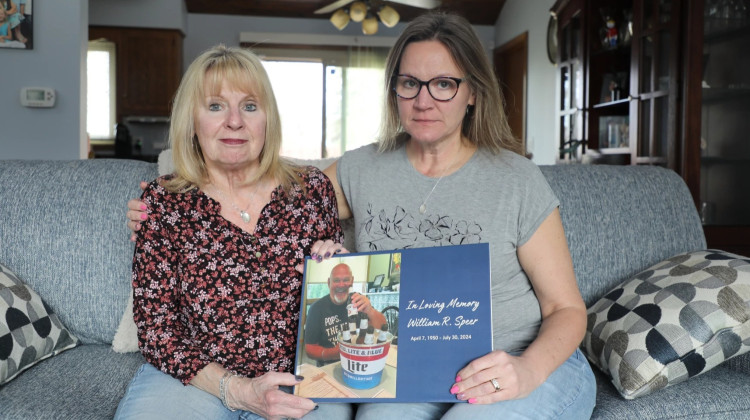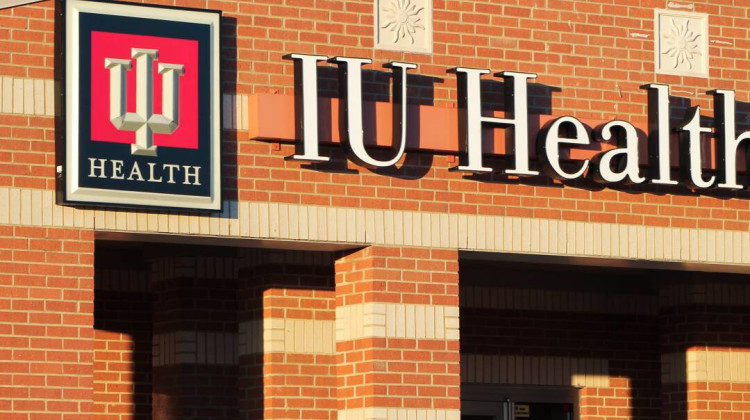
The emergency room at Franciscan Health in Hammond will close on Dec. 31.
Michael Gallenberger / Lakeshore Public RadioResidents of Northwest Indiana’s largest city will soon have to travel to other communities for emergency medical care. The emergency room at Franciscan Health in Hammond will stop taking ambulances at 6 a.m. on Dec. 23, according to a hospital spokesperson. Then on Dec. 31 all emergency room services will come to an end.
Hammond Fire Chief Jeff Smith said his department's ambulances will have to take patients to Community or Franciscan hospitals in neighboring Munster – or to St. Catherine Hospital in East Chicago.
“It got thrown in our lap, so we have to adapt. We’re just going to have to. The three other hospitals – we’re going to overwhelm St. Catherine’s. We’re going to overwhelm Community,” Smith said.
In 2021, Franciscan Health announced plans to scale down operations at the former St. Margaret Hospital but keep its emergency department open, along with a 10-bed inpatient unit. Plans changed this past November, when Franciscan announced those services would also close, due to a decline in patients and a shortage of health care workers. That will leave mostly clinics and doctor's offices at the site. The hospital's interim president and CEO said in a statement that most of the emergency room patients would “be better served in a lower cost setting."
Dr. Daniel Elliott, president of the Indiana Chapter of the American College of Emergency Physicians, said there seems to be a trend of hospital systems trying to anticipate where to maintain or expand facilities based on anticipated population growth.
“In the United States, medicine, unfortunately, has gotten more corporatized,” Elliott said. “It’s more business-oriented. And that’s just currently the state of affairs within our country.”
Research shows that when ERs close, people treated for life-threatening conditions like heart attacks have worse outcomes. The closures can also contribute to health disparities.
Dr. Selwyn Rogers is a professor of surgery at University of Chicago Medicine and the founding director of the university's trauma center.
“Asthma attacks will kill you. Heart attacks will kill you. A brain bleed will kill you. And if you don’t have access to emergency medical services for those acute, life-threatening conditions in a timely way, there will be impact to people’s health,” Rogers said.
In Hammond, Smith worries residents could die, as a result of the longer ambulance trips.
“So we can get to St. Margaret’s in the central Hammond area within 45 seconds to a minute,” Smith said. “Now, we have to go to St. Catherine’s, which we could get caught by a train going into East Chicago. In North Hammond, if we’re just on the other side of the railroad tracks, we could get caught by a train going to St. Margaret’s, but if we get caught by a train now, we have to go even farther to get all the way to Munster.”
But even if patients survive, they could still suffer major health impacts. And Rogers says, that affects the entire community.
“Who’s going to take care of them? Who pays the cost of that? We all do,” Rogers said.
And the problem won't be unique to Hammond. Elliott points out that many places in Indiana have far longer hospital travel times.
“Rural communities have honestly been dealing with this for years – the long transport times, lack of access to medical services, delayed transport – and that’s something that it sounds like, unfortunately, is going to be starting to affect the more urban Hammond area,” Elliott said.
The emergency room closure will have ripple effects beyond Hammond's city limits. Smith notes that nearby Illinois communities like Calumet City and Lansing will also have to find somewhere else to send patients.
“It’s just not us, but unfortunately, it’s our hospital,” Smith added. “It’s been here for over 100 years, and it’s kind of disheartening. They sent an email out Monday, ‘Hey, as of the 23rd, we’re not taking any more ambulance patients.’ It’s like, ‘OK, great. I’m glad you guys are thinking in the neighborhood.’”
 DONATE
DONATE






 Support WFYI. We can't do it without you.
Support WFYI. We can't do it without you.